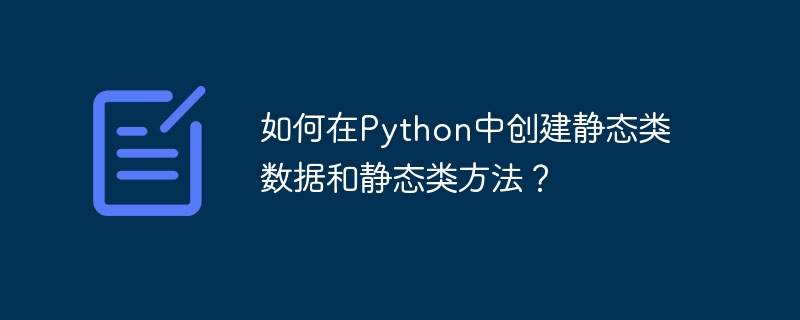如何在Python中建立靜態類別資料和靜態類別方法?
- WBOYWBOYWBOYWBOYWBOYWBOYWBOYWBOYWBOYWBOYWBOYWBOYWB轉載
- 2023-09-07 22:13:02910瀏覽

Python 包含靜態類別資料和靜態類別方法的概念。
靜態類別資料
在這裡,為靜態類別資料定義一個類別屬性。如果您想為屬性指派新值,請在指派中明確使用類別名稱 -
class Demo:
count = 0
def __init__(self):
Demo.count = Demo.count + 1
def getcount(self):
return Demo.count
我們還可以回傳以下內容,而不是回傳 Demo.count -
return self.count
在 Demo 的方法中,像 self.count = 42 這樣的賦值會在 self 自己的字典中建立一個名為 count 的新的、不相關的實例。類別靜態資料名稱的重新綁定必須始終指定類,無論是否在方法內部 -
Demo.count = 314
靜態類別方法
讓我們看看靜態方法是如何運作的。靜態方法綁定到類別而不是類別的物件。 statis 方法用於建立實用函數。
靜態方法無法存取或修改類別狀態。靜態方法不知道類別狀態。這些方法用於透過獲取一些參數來執行一些實用任務。
請記住,@staticmethod 裝飾器用於建立靜態方法,如下所示 -
class Demo:
@staticmethod
def static(arg1, arg2, arg3):
# No 'self' parameter!
...
範例
讓我們來看一個完整的例子 -
from datetime import date
class Student:
def __init__(self, name, age):
self.name = name
self.age = age
# A class method
@classmethod
def birthYear(cls, name, year):
return cls(name, date.today().year - year)
# A static method
# If a Student is over 18 or not
@staticmethod
def checkAdult(age):
return age > 18
# Creating 4 objects
st1 = Student('Jacob', 20)
st2 = Student('John', 21)
st3 = Student.birthYear('Tom', 2000)
st4 = Student.birthYear('Anthony', 2003)
print("Student1 Age = ",st1.age)
print("Student2 Age = ",st2.age)
print("Student3 Age = ",st3.age)
print("Student4 Age = ",st4.age)
# Display the result
print(Student.checkAdult(22))
print(Student.checkAdult(20))
輸出
Student1 Age = 20 Student2 Age = 21 Student3 Age = 22 Student4 Age = 19 True True
以上是如何在Python中建立靜態類別資料和靜態類別方法?的詳細內容。更多資訊請關注PHP中文網其他相關文章!
陳述:
本文轉載於:tutorialspoint.com。如有侵權,請聯絡admin@php.cn刪除

